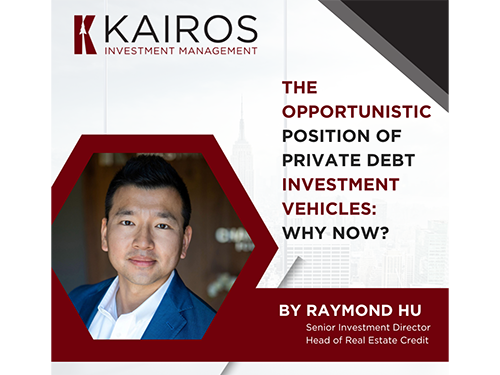When and How Value-Add Strategies Make Sense
Authored by Jonathan Needell, President and Chief Investment Officer March 28, 2022 Value-add can be an excellent investment strategy...

By Raymond Hu, Senior Investment Director – Head of Real Estate Credit
October 17, 2023
Just a few years ago, commercial real estate debt financing was plentiful—and inexpensive. With federal funds rate at near zero, traditional lenders were happy to support various projects at higher leverage rates and sponsors borrowed, bought, and built asset after asset.
Fast forward a few years and it’s obvious that activity has slowed down significantly. Owners and developers now face property valuation resets, rising interest rates, and a noticeable decline in available debt, all of which is likely to remain the same over the next few years.
However, alternative lenders (such as private debt vehicles) have also been active in the years since the Great Financial Crisis. At Kairos Investment Management Company, we believe the current environment and following fundamentals will continue to support debt finance opportunities and steady investment returns.
Ongoing Rate Hikes
In early 2020, the Effective Federal Funds Rate (EFFR) was near zero. By August 2023, the Fed had increased the benchmark short-term rate to 5.3%, the highest level since 2001.
The Secured Overnight Financing Rate Data—SOFR—is also impacted by the Fed’s actions. SOFR analyzes the average rate institutions can borrow overnight using U.S. Treasury bonds as collateral. SOFR is the predominant index rate for floating rate loans. Lenders usually apply a spread or margin over SOFR to calculate their interest rates. In January 2022, the SOFR stood at close to zero. Today, the rate hovers around 5.3%.
Are the rate hikes working? To some extent, yes. Inflation is easing; it’s well below the 9%+ reported during the summer of 2022. However, it’s still not at the 2% mark where the Fed is comfortable. Furthermore, unemployment remains low, while economic growth is still above the Fed’s 1.8% target rate.
There’s been much speculation about the Fed’s next moves. While continued rate hikes haven’t been ruled out, some hopeful economists believe the “pause” button could be hit on hikes this fall. Yet, it is more realistic that base rates will remain high, at least through the end 2023.
This might be troublesome for traditional lenders. Private debt vehicles and bridge lenders, however, are in an excellent position to price deals off the base rate and capitalize on the incremental return. Additionally, these entities can also structure SOFR “floors.” The result for private investors? Continued benefits from higher base rates on new originations and less risk to property cash flows.
Funding Gaps and Credit Spreads
Banks and credit unions (“traditional lenders”) have faced challenges over the past several years, and even more in recent months.
During the past decade, stricter liquidity requirements led to more stringent lending conditions on commercial real estate projects. Additionally, many larger banks stopped financing CRE projects to reduce their exposure in the industry to improve their loan-to-deposit ratio (“LDR”).
Then came the first half of 2023. In the first several months, Silicon Valley Bank and Signature Bank collapsed, while governments—and then private financial institutions—took over First Republic Bank and Credit Suisse Group AG.
The (somewhat) good news on this front is that the banking system didn’t collapse. The not-so-good news is anticipated government regulations to stave off even more bank collapses. This is already leading to even tighter underwriting standards, a reduction in CRE credit availability and ever-increasing credit spreads and funding gaps. The regional banks, which have been stalwart lenders to the CRE industry, are also pulling back in the face of deposit outflows.
Nonetheless, there is still demand for CRE financing as upcoming loan maturities will require refinancing. This demand creates an opportunity for real estate debt vehicles as they aren’t subject to the same federal and state regulations as traditional lenders. Private lenders can negotiate flexible terms and rates for borrowers based on capital from investors rather than a percentage of individual and commercial deposits.
Upcoming Maturities and Increased Market Share
The first half of 2023 also generated news about upcoming CRE loan maturities.
Data provider Trepp reported that nearly $1.5 trillion in commercial mortgages is anticipated to mature within the next three years. For borrowers that may need to refinance, debt costs will be higher compared to when the original loans were issued. As previously mentioned, many traditional lenders have pulled back from the commercial real estate sector. This shift has created challenges among borrowers, especially those with office investments in their portfolio(s). Refinancing, especially for that sector, has been challenging and will continue to be for the foreseeable future given the uncertainty surrounding in-office versus remote work.
Private debt strategies can fill multiple funding gaps, such as acquiring a stressed senior mortgage from a bank’s balance sheet, issuing mezzanine debt to help refinance an upcoming maturity, or even offering private equity liquidity for hard-to-finance projects. The attractive benefit of private debt vehicles is that they aren’t bound by the same restrictions or underwriting requirements as traditional lenders. Investments, versus a percentage of commercial and individual checking and savings deposits, support these opportunities.
The Opportunistic Takeaway
A recent report from Moody’s Analytics reports that non-bank CRE lenders actually account for more than 60% of the real estate debt market in the United States. It’s not surprising as traditional lenders have been subject to stringent lending standards for a myriad of circumstances. Among those are the GFC, increased federal and state regulatory issues, overall economic volatility, and recent bank failures.
Despite all that, demand for commercial real estate financing has never been stronger. Private debt vehicles, provided by firms like Kairos, can help satiate the need for refinancing in today’s real estate shifting paradigm. Increasing base rates and ongoing credit spreads position investment vehicles in an ideal position to provide liquidity and fill funding gap, support refinancing efforts, and deliver risk-adjusted returns to investors.
For questions, contact investor relations at investorreporting@kimc.com or 949-800-8500.
 Back to All
Back to All
Authored by Jonathan Needell, President and Chief Investment Officer March 28, 2022 Value-add can be an excellent investment strategy...
The Affordable Housing Crisis The U.S. is currently undergoing a major housing crisis with only 37 affordable rentals available...
Authored by Raymond Hu, Senior Investment Director – Head of Real Estate Credit May 2, 2023 Commercial real estate...
By Heather Lewis, Chief Compliance Officer and Jeanna Mackin, Associate Director of Human Resources August 9, 2023 Over the...
Authored by Jonathan Needell, President and Chief Investment Officer June 6, 2022 Environmental, social and governance (ESG) has become...
Doing Well by Doing Good Authored by Trevor Schuesler, CFA, Associate Investment Director November 17, 2021 One of America’s...
Finding Growth in Unexpected Places Authored by Trevor Schuesler, CFA, Associate Investment Director March 16, 2021 John Burr Williams’...
We Made a Promise to Strive for Deep Impact 2020 was a challenging year for humankind, underscored by the...
18101 Von Karman, Suite 1100
Irvine, CA 92612
(949) 709-8888
(949) 800-8500
investorreporting@kimc.com
Copyright © 2024 Kairos Investment Management Company | Disclosures
Kairos Investment Management Company is an Equal Opportunity Employer and, as such, does not discriminate in employment on the basis of an applicant or employee’s race, ethnicity, ancestry, national origin, color, sex, pregnancy (or related medical conditions), childbirth, family status, gender, gender identity or gender expression, age, religion, marital status, sexual orientation, disability, medical condition, military or veteran status, reproductive health decision making, or any other protected classification or characteristic under applicable federal, state or local law. Kairos will not discriminate against an applicant or employee who has one or more protected classifications, is perceived or regarded as having one or more protected classifications, or is associated with someone who has one or more protected classifications.
Kairos Investment Management Company will also provide reasonable accommodations to applicants and employees who may need such accommodations in connection with employment with Kairos on the basis of their disability, religion, status as a victim of domestic violence or pregnancy. An applicant who needs an accommodation in order to pursue employment with Kairos should contact Human Resources at HR@KIMC.com to request such accommodations. Kairos will engage in a good faith interactive process with the applicant to explore accommodations that will be effective, reasonable and not create an undue hardship.
You can see how this popup was set up in our step-by-step guide: https://wppopupmaker.com/guides/auto-opening-announcement-popups/
You can see how this popup was set up in our step-by-step guide: https://wppopupmaker.com/guides/auto-opening-announcement-popups/